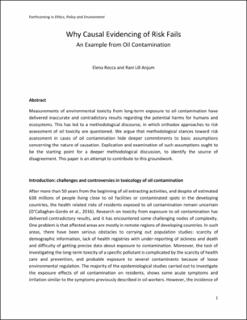| dc.contributor.author | Rocca, Elena | |
| dc.contributor.author | Anjum, Rani Lill | |
| dc.date.accessioned | 2021-10-08T10:31:08Z | |
| dc.date.available | 2021-10-08T10:31:08Z | |
| dc.date.created | 2018-06-25T13:45:27Z | |
| dc.date.issued | 2019 | |
| dc.identifier.citation | Ethics, Policy & Environment. 2019, 1-17. | en_US |
| dc.identifier.issn | 2155-0085 | |
| dc.identifier.uri | https://hdl.handle.net/11250/2788682 | |
| dc.description.abstract | Measurements of environmental toxicity from long-term exposure to oil contamination have delivered inaccurate and contradictory results regarding the potential harms for humans and ecosystems. This has led to a methodological discourse, in which orthodox approaches to risk assessment of oil toxicity are questioned. We argue that methodological stances towards risk assessment in cases of oil contamination hide deeper commitments to basic assumptions concerning the nature of causation. Explication and examination of such assumptions ought to be the starting point for a deeper methodological discussion, to identify the source of disagreement. This paper is an attempt to contribute to this groundwork. | |
| dc.description.abstract | Why Causal Evidencing of Risk Fails. An Example from Oil Contamination | |
| dc.language.iso | eng | en_US |
| dc.title | Why Causal Evidencing of Risk Fails. An Example from Oil Contamination | en_US |
| dc.type | Journal article | en_US |
| dc.type | Peer reviewed | en_US |
| dc.description.version | acceptedVersion | |
| dc.source.pagenumber | 1-17 | en_US |
| dc.source.journal | Ethics, Policy & Environment | en_US |
| dc.identifier.doi | 10.1080/21550085.2019.1625547 | |
| dc.identifier.cristin | 1593684 | |
| dc.relation.project | Norges forskningsråd: 240073 | |
| cristin.unitcode | 192,11,0,0 | |
| cristin.unitname | Handelshøgskolen | |
| cristin.ispublished | true | |
| cristin.fulltext | postprint | |
| cristin.qualitycode | 1 | |
